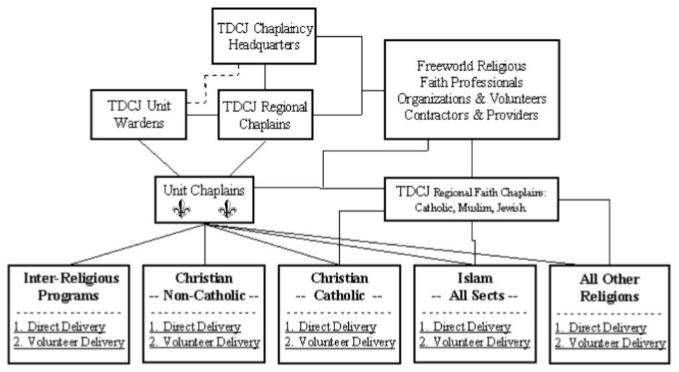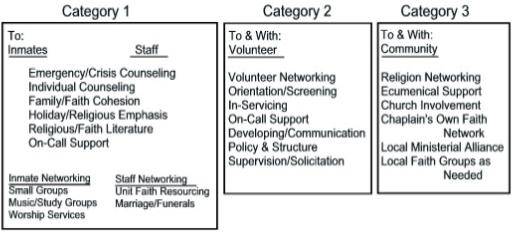What's
does a Prison Chaplain do?
Here are a few of the
responsibilities, the higher functions,
some of the finer issues of a
multi-faceted Profession
Click to jump to the following
TDCJ Mission Statement ~ TDCJ
Chaplaincy Mission Statement
Pastoral Care ~ Quality
Program Management ~
Therapeutic Community ~ Method
of Delivery ~ The Challenge
Prison
Chaplain Network Flowchart
Prison Chaplain
Pastoral Care Direct Delivery
Prison
Chaplain Pastoral Care Volunteer Delivery
Click Here to
e-mail us: Parity@PreciousHeart.net
TEXAS
DEPARTMENT OF CRIMINAL JUSTICE
The
mission of the Texas Department of Criminal Justice is to provide public safety,
promote positive change in offender behavior, reintegrate offenders into
society, and assist victims of crime.
TDCJ
Web Site, January 2000
The Texas
Department of Criminal Justice will be open, ethical and accountable to our
fellow citizens and work cooperatively with other governmental entities.
We will foster a quality working environment free of bias and respectful of each
individual. Our programs will provide a continuum of services
consistent with contemporary standards to confine, supervise and treat criminal
offenders in an innovative, cost effective and efficient manner.
TDCJ Quality Control
Council
TDCJ Newsletter, Revised March/April 1994
TDCJ-ID
CHAPLAINCY DEPARTMENT
MISSION
STATEMENT
The mission of
the Chaplaincy Department of the Texas Department of Criminal Justice:
Institutional Division is to positively impact public safety and the reduction
of recidivism through rehabilitation and re-integration of adult felons into
society through
[1]
Pastoral Care,
[2]
Quality Program Management and a
[3]
Therapeutic Community.
TDCJ
Chaplaincy
Strategic Plan
Correctional Chaplaincy Mission
MISSION:
to provide quality [1]
Pastoral Care, [2]
Program Management, and [3] a
Therapeutic Community that promotes public safety, produces change in
criminal behavior, and reintegrates offenders into society. See the
definitions below.
Pastoral
Care ~ Quality Program Management ~ Therapeutic
Community ~
Method of Delivery ~ The
Challenge
[1]
Pastoral Care: doing what it takes to
encourage someone toward a higher level of living, especially within a Faith
Context and struggling with that
person in mutual growth. Quality Pastoral Care is care and a
relationship delivered in a religious context with the purpose of determining
and developing the vital issues of ultimate concern in life. This
developing is growth--growth that enriches meaning in life and fosters change
toward higher degree moral living as defined by a chosen faith, the essence of religion.
What
are his or her vital issues of ultimate concern in faith, life, heart, and soul?
How can they come to terms with their vital issues? How can they
work through their vital issues in their community of faith, in their family, in
the hostile environment of prison and in society as a whole?
[2]
Program
Management:
delivers Pastoral Care
through the inter-religious service of the chaplain, through the chaplain's own
religion and through the chaplain's resources and associates in other
religions. The theology, philosophy, beliefs, and practices of every
religion address innumerable Vital
Issues of ultimate concern. These vital
issues include all concerns of heart and soul, every aspect of whatever makes up
the personhood and being of each person as they relate to the rest of the
universe. A few of these Vital
Issues are:
God, Supreme Being &/or Spirit, Existence--Being--Non-Being,
Life Crises & Goals,
Identity & Sexuality,
Eternity & Annihilation,
Nature of Growth & Death,
Universal
Forces,
Origin--Beginning--Ending,
Purpose Pain &
Pleasure,
Purpose of God & Humankind,
Derivation & Purpose of Law,
Sources of Authority,
Destiny of Humankind,
Coping with Life & Prison,
Scripture
Interpretation,
Transcendence,
Truth--Dignity--Honor--Love, Cycles
& Stages of Life,
Moral & Social Accountability, Family--Marriage--Separation,
Wisdom & Life
Skills,
Essence of Good--Evil,
Essence of Humankind & Principles, Purpose--Meaning in life.
[3]
Therapeutic
Community:
is the chaplains and
ministry team as they relate to the inmates, the staff, the community and each
other in the delivery of quality pastoral
care. This delivery is within the context of the entire treatment and
correctional team.
METHOD OF DELIVERY:
in the context of sustained religious programming, the needs of persons
determine the allocation of available resources. The closed nature
and the close quarters of the system force the creation of unique and intense
relationships. Though a preponderance of delivery is directed toward
the inmates, effective delivery has a focus that includes all persons:
staff, inmates, volunteers, chaplains and the families of all. Only
by being available to all of the needs and vital issues of every person in the
system--regardless of faith--will the highest possible level of pastoral care be
available to any one person.
THE CHALLENGE:
Beyond Full Definition. The caregivers are only mortal. At
times the best effort is a fragile struggle between two people, two souls, two
sets of vital issues: one is as available as he or she is able, the
other is on the brink of collapse into a lower level of living or destruction.
So the history of every religion brings a confidence that if anyone takes a seed
of faith there is in that seed a hope--a hope in a destiny of significance,
worth and purpose. The seed sown has power in itself, far beyond
the limitations of the mortal sower.
M. G. Maness, Chaplain
[This
is the job, in part, of the TDCJ Unit Chaplain making the same salary as an entry level TDCJ Programmer II
whose minimum qualifications ask for a HS/GED & 1 year of experience; However, No experience in any field is required if
that person has BS with a
smidgeon of computer hours. Does not everyone, inside and outside of
TDCJ, intuitively understand the kind of education and experience it takes to do
the above within the interpersonally hostile environment of a prison? No
one anywhere would expect a 20 or even 30 year old to be truly effective to the
above tasks.]
Prison
Chaplain Network Flowchart
The
following is only
part of the multi-faceted work and network and spectrum of tasking
involved in Criminal Justice Chaplaincy. It
is far from complete, far from comprehensive, for each TDCJ Chaplain has
something uniquely specific going on, on their units.
And of course, while similar, there would be whole categories that would
need to be added to fully understand the multi-faceted nature of TYC and MHMR
chaplaincy work.
Notice
how in each category of faith delivery there are two levels:
Direct Delivery and Volunteer Delivery.
This indicates the broad spectrum and variety of a Unit Chaplainís
leadership and network and supervision. The
following sections explain further the breadth of the networking.

This
is just part of the network.
Prison
Chaplain Pastoral Care Direct Delivery
Direct
delivery is the delivery of quality pastoral care by the Unit Chaplain to the
following three (3) categories, including the chaplainís supervision of
Volunteer Chaplains who also give limited direct delivery to Category 1 and help
with Categories 2 and 3. And
chaplains regularly network with local and national clergy and with other
volunteers in the organization and delivery of pastoral care in some aspect
within all three categories.

Prison
Chaplain Pastoral Care Volunteer Delivery Supervision
Chaplains
supervise both the direct & indirect delivery of quality pastoral care to
Inter-Religious Programs. In such programs inmate clients from potentially all
faith/religious persuasions are allowed participation.
This is just one aspect of many of how chaplains supervise the volunteer
delivery of pastoral care. The
following is just one example of one chaplains initiative to expand current
volunteer programming. Many
chaplains have other organized efforts to resource the community, and to a great
degree such accessing of the community depends upon the community itself.
~
Click Here to
e-mail us: Parity@PreciousHeart.net
~